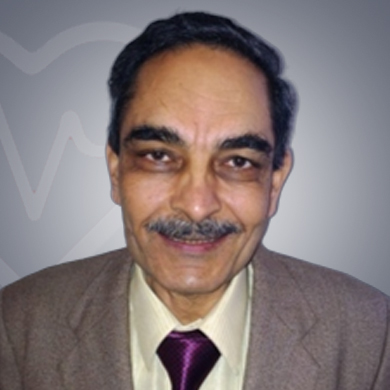
Nephrologist
Fortis Hospital , Mohali, India32 Years of experience
Speaks: English
Dr. HJS Gill treats a number of conditions some of whom are mentioned here for your perusal:
People who are having some serious infections, that includes tuberculosis, hepatitis and bone infections are those that could be a good candidate for a kidney transplant. A recent occurrence of cancer or being a cancer patient in the present also could make you an excellent candidate for a kidney transplant. Kidney transplant might become a necessity for patients having severe case of liver disease or cardiovascular disease.
The signs and symptoms which lead to end stage kidney disease necessitating a kidney transplant are outlined below.
End-stage renal disease (ESRD) or what is known as Kidney failure is a big sign for you to get a kidney transplant. Patients who have been diabetic for a pretty long time might end up having this disease. Another major reason that could result in serious irreversible damage to the kidneys is having High Blood Pressure (Hypertension).
The operating hours of the doctor are from 10 am to 6 pm, Monday to Saturday, with an off on Sunday. You can be up and about from the surgery in a day or two and reach home in one week.
The list of procedures performed by Dr. HJS Gill are mentioned here for your convenience.:
Of the types of kidney transplants, the cadaveric renal transplant and living donor kidney transplant is so differentiated owing to the nature of the donor whether deceased or alive respectively. A preemptive kidney transplant actually preempts the need for dialysis to come in at all. It is also important to check if the transplanted kidney is working properly or not and regular checkups post the surgery are required to do so..

Share Your Experience about Dr. HJS Gill

It is when you need your diseased kidney or kidneys removed and replaced with a healthy kidney that you visit a Kidney Transplant Surgeon. It is not just the surgery which the surgeon performs but he also helps you through the entire process from preoperative through to the rehabilitation and recovery. Recommending the right tests and prescribing medicines is also done by them. The surgeon is the most important component of the core team which is inclusive of nurses, technicians and nephrologist.
There is a number of tests required to evaluate your candidature for a kidney transplant and they are listed below::
Here is a comprehensive list of additional tests needed before and during the kidney transplant procedure.:
The tests are important to be performed at the right time and at proper frequencies to ensure the accuracy of the process, acceptance of the kidney and its proper functioning. The heart tests such as the Echocardiogram, Electrocardiogram and the cardiac stress test are immensely important to know the heart strength.
You must visit a Kidney Transplant Surgeon if you have any of the commonly seen symptoms associated with a kidney failure. Many transplants are done on patients who are already on dialysis but can be opted by patients prior to being put on dialysis. They also help you with post transplant checkups to see whether your body is accepting the transplanted kidney well. It is the surgeon whom you must consult when you are in the process of deciding whether to get a transplanted kidney or not.